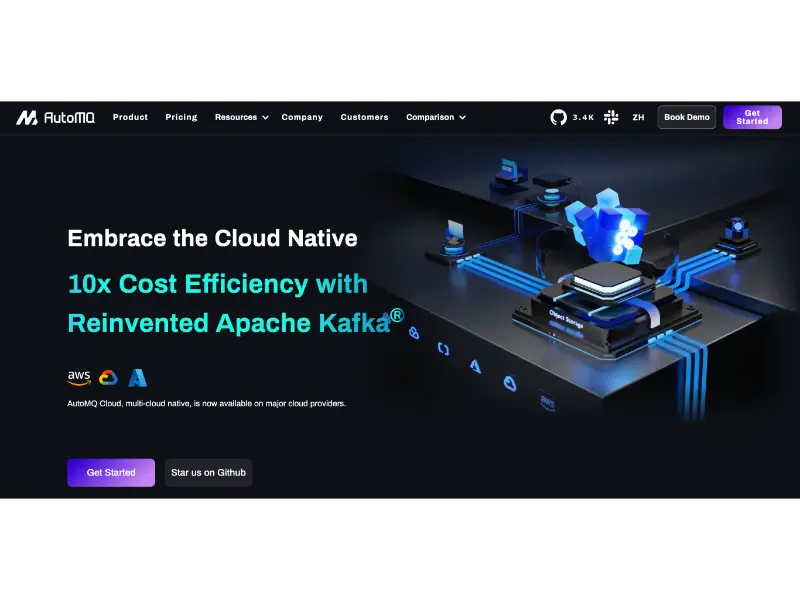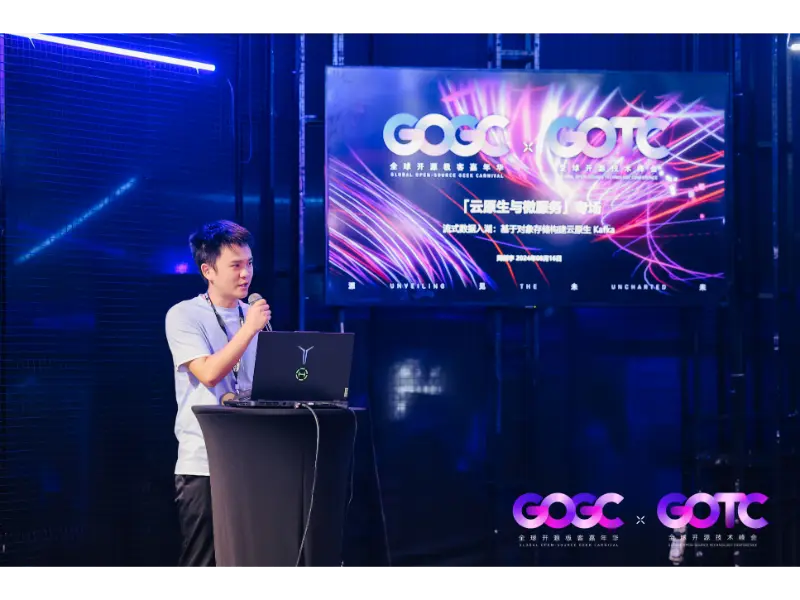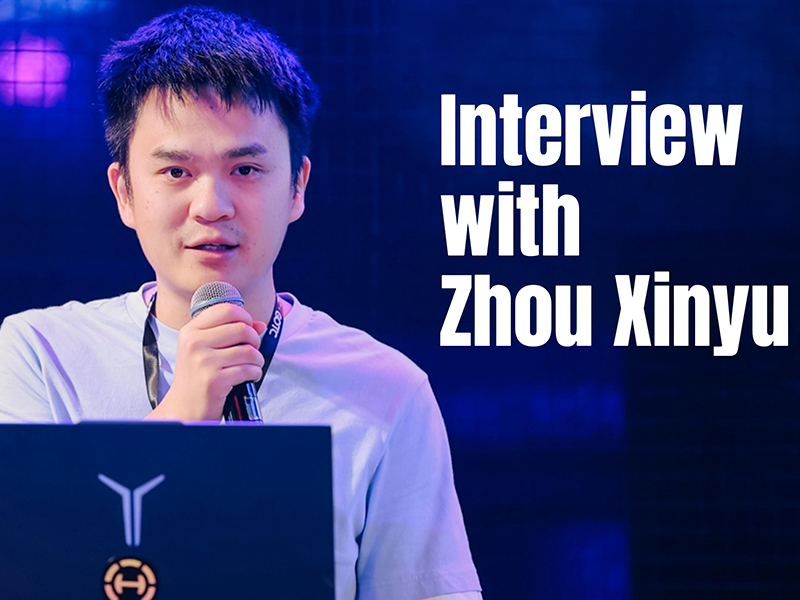- Zhou Xinyu discusses AutoMQ’s commitment to modernising traditional middleware technologies for cloud-native environments.
- The evolution of cloud computing requires embracing cloud-native practices such as on-demand resource provisioning and auto-scaling.
- AutoMQ aims to modernise foundational software, focusing on cloud-native solutions to address the limitations of traditional messaging systems.
Zhou Xinyu, Co-founder & CTO of AutoMQ, he is a member of Apache Software Foundation, co-founder of Apache RocketMQ & member of PMC. He has nearly a decade of experience in cloud computing, and has gone through the complete cloud journey of AliCloud middleware, and is the advocate of the concept of cloud-native cloud.
Journey of founding AutoMQ
“We believe that all foundational software has the potential to transition to a cloud-native stage in the future.”
Zhou Xinyu, co-founder and CTO of AutoMQ
Zhou Xinyu, the co-founder and CTO of AutoMQ, began his career at Alibaba, where he contributed significantly to the company’s cloud migration efforts. “After graduating, I joined Alibaba and initially worked on supporting Alibaba’s middleware department, which sustains the Singles’ Day event on Taobao and Tmall,” Zhou shared during the interview. His experience with public and hybrid clouds while at Alibaba laid the foundation for his understanding of the cloud-native landscape.
The establishment of AutoMQ in late 2022 was driven by a vision to innovate within the cloud-native space. Zhou explained, “Our mission at AutoMQ is to first bring foundational software in the messaging and stream storage fields into the cloud-native domain.” This focus on cloud-native solutions reflects a broader industry shift towards cloud optimisation, a trend Zhou has observed closely throughout his career.
AutoMQ’s foundation is built on the idea that foundational software must evolve to meet the demands of modern cloud environments. Zhou emphasised, “We believe that all foundational software has the potential to transition to a cloud-native stage in the future.” This vision guides AutoMQ’s current projects and long-term goals.
Also read: Tech Mahindra and Google Cloud join forces to develop AI
The unique position of AutoMQ in the middleware market
“We were inspired by foreign companies like Copilot, which have grown significantly in this field.”
Zhou Xinyu, co-founder and CTO of AutoMQ
AutoMQ’s uniqueness in the middleware market stems from Zhou’s extensive experience and the recognition of a gap in the market. Reflecting on his past experiences, Zhou stated, “In the messaging and stream storage domains, there are two key products, Apache Kafka and Apache RegionQ.” However, he noted that these products were designed for on-premises environments, lacking the innovation needed for cloud-native applications.
Zhou and his team were motivated by the realisation that cloud vendors were not prioritising architectural innovation for these niche products. “Cloud vendors lack the incentive to invest heavily in overhauling or innovating architectures for niche products,” Zhou observed. This insight inspired the creation of AutoMQ, a company dedicated to advancing cloud-native technology in ways that larger cloud providers were not.
AutoMQ differentiates itself by focusing on technological innovation rather than just productisation. Zhou remarked, “We were inspired by foreign companies like Copilot, which have grown significantly in this field.” This inspiration, combined with the team’s deep expertise, positions AutoMQ to lead the way in cloud-native middleware solutions.

Challenges and solutions in expanding AutoMQ
“Our focus in the Western market is still to do operational promotions to first attract the attention of developers and gain their recognition.”
Zhou Xinyu, co-founder and CTO of AutoMQ
As a startup, AutoMQ faces several challenges, particularly in gaining customer trust. Zhou acknowledged, “The biggest challenge we face is establishing trust with our customers.” Despite these hurdles, AutoMQ’s team has managed to leverage their solid background and professional credibility to reassure clients about their capabilities.
To overcome concerns about stability and brand reputation, Zhou highlighted a multifaceted approach. “We need to communicate more about our technical architecture and philosophy,” he explained, emphasising the importance of transparency and rigorous testing. This strategy has proven effective, particularly in the domestic market, where partnerships with major companies like LittleRedBook and JD.com have bolstered AutoMQ’s reputation.
Looking internationally, AutoMQ is taking steps to build a presence in markets like Southeast Asia and beyond. Zhou mentioned, “Our focus in the Western market is still to do operational promotions to first attract the attention of developers and gain their recognition.” By prioritising community engagement and technological innovation, AutoMQ aims to establish a strong foothold in these new markets.
Also read: What is cloud data integration and why is it important?
AutoMQ’s short-term and long-term goals
AutoMQ’s goals are both ambitious and adaptive, shaped by customer needs and market realities. Zhou emphasised the importance of staying focused, stating, “As a startup, it’s not suitable to be greedy or to spread our product line too thin.” Instead, AutoMQ is concentrating on resolving specific pain points in existing technologies like Kafka.
In the short term, AutoMQ aims to expand the adoption of its architecture across various cloud markets, both domestically and internationally. Zhou articulated, “Our short-term plan is to sell our AutoMQ architecture in various cloud markets.” Success in this area is seen as a crucial step towards broader market acceptance and technological leadership.
Long-term, AutoMQ is looking to integrate its solutions with data lakes and AI technologies. Zhou shared his vision, “Once stream data can enter the lake and fully integrate with other ecosystem data, it supports large-scale data analysis, which could unleash the value of data.” This forward-looking approach ensures that AutoMQ remains at the forefront of technological innovation, preparing for a future where real-time AI and data lakes are central to cloud-native operations.

The future of middleware in a cloud-native world
“From the initial monolithic architecture, the monolithic architecture gradually generated this demand for asynchronous operations, which led to the emergence of messaging middleware.”
Zhou Xinyu, co-founder and CTO of AutoMQ
Zhou Xinyu sees a significant shift in the role of middleware as cloud-native environments continue to evolve. He explained that middleware, originally created to address specific business needs within platforms, is becoming increasingly obsolete. “Middleware might continue to evolve, possibly only leaving messaging middleware,” Zhou predicted, highlighting the ongoing transformation within the industry.
The rise of microservice and the demand for asynchronous communication have driven the evolution of middleware, particularly in messaging. Zhou reflected, “From the initial monolithic architecture, the monolithic architecture gradually generated this demand for asynchronous operations, which led to the emergence of messaging middleware.” As businesses move towards more modern architectures, the role of middleware is expected to diminish, with only the most essential components remaining.
AutoMQ is positioned to play a pivotal role in shaping the future of middleware by focusing on messaging solutions that align with cloud-native principles. Zhou’s insights suggest that as the industry continues to move away from traditional middleware, companies like AutoMQ will lead the charge in developing the next generation of cloud-native technologies.

